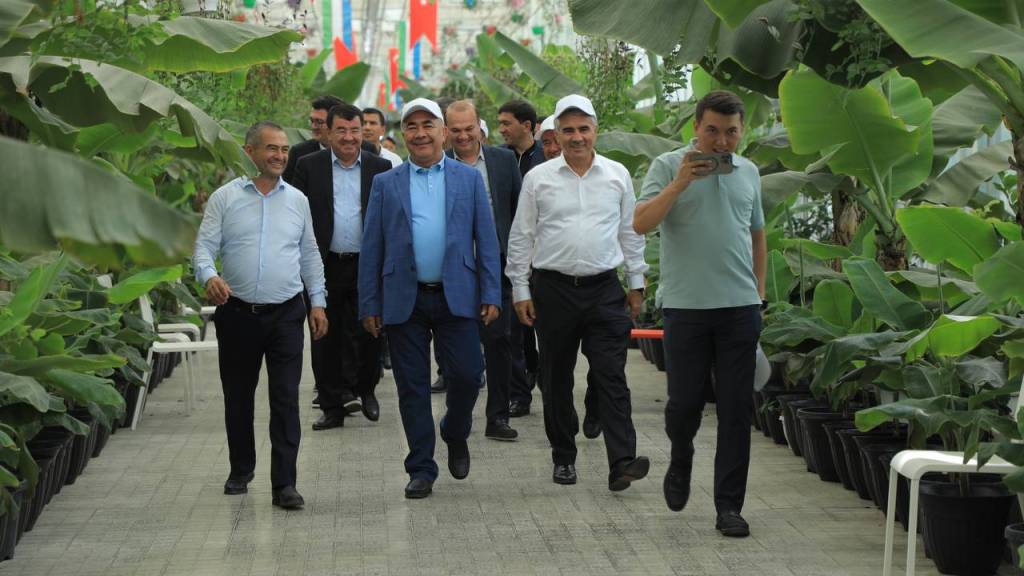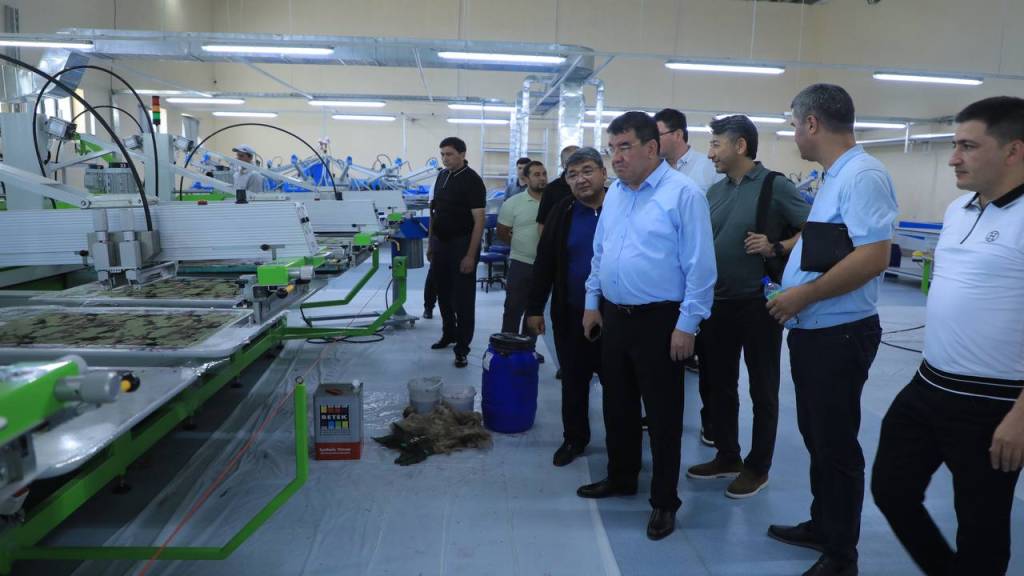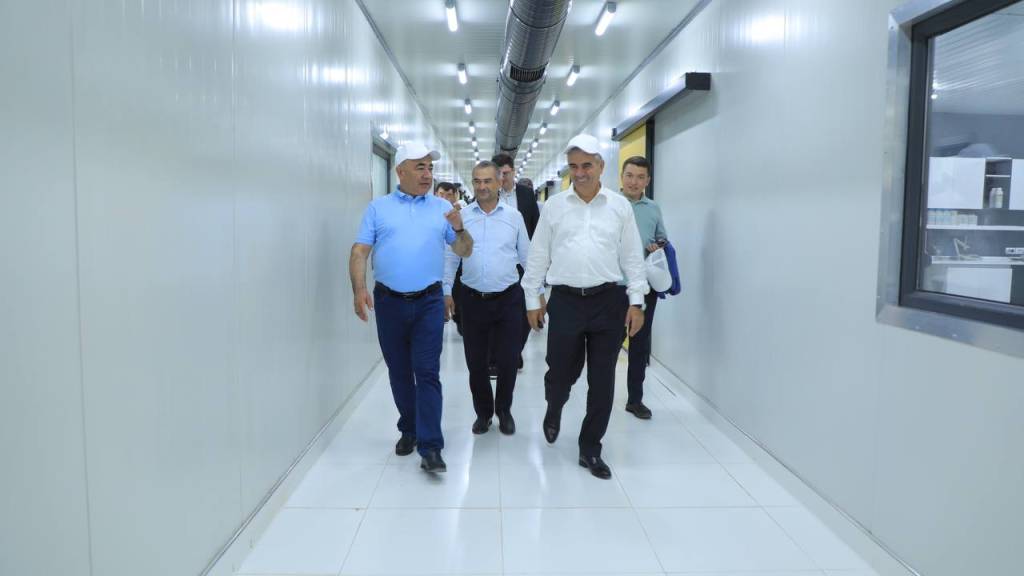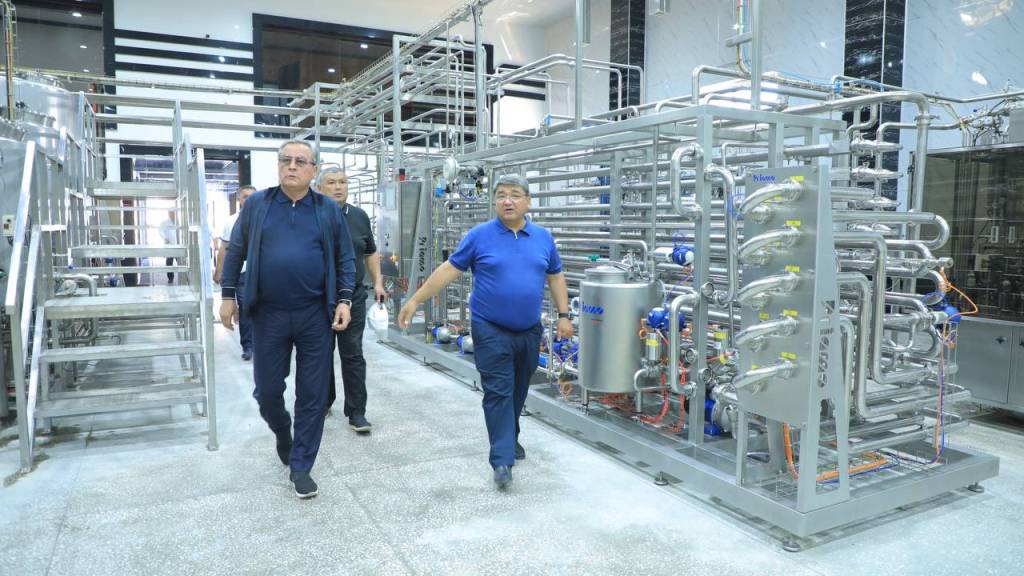
During a trip to Bukhara region on August 10-11 this year, the President gave instructions on organizing an inter-territorial exchange of experience. To ensure the execution of instructions, a delegation led by the hokims of Tashkent and Andijan regions arrived in Bukhara region.
Milk processing and packaging have been established at Bukhoro Agrocluster DZZ enterprise of Bukhoro Agrocluster system. This modern facility was built with a $6.2 million investment and is equipped with Italian and Russian-made plants. The enterprise, which began operating in 2021, currently processes 22 thousand tons of milk annually, producing kefir, cheese, yogurt, and sour cream – more than forty dairy products. 150 people are employed.
Members of the delegation got acquainted with the production process at the enterprise. Expansion of the scale of work and increase in income contribute to the development of the cluster. New buildings were built on the territory of the complex. Among them is a modern laboratory for determining soil fertility. Equipped with modern German technologies, the laboratory can define more than forty indicators of soil composition and about ten indicators of water.

On the territory of Bukhara region, soil salinity is much higher than in other areas. To obtain good yields, a deep analysis of the soil is necessary. The laboratory studies its chemical composition and, determines the need for plants in mineral and organic fertilizers, develops measures to normalize the composition of the soil.
The data obtained in the laboratory is placed on the platform “Agro Smart Map Uz” – another enterprise project. Based on these data, landowners receive the necessary agrotechnological recommendations.
The participants received detailed information about the enterprise and laboratory system of work, its advantages, and the following projects of Bukhoro Agrocluster.

The guests visited the Bahauddin Naqshband mausoleum. They recited prayers and duas, asking for peace and prosperity for the country.
The members of the delegation showed great interest in the activities of the Bukhara-Varnet cluster operating in Bukhara district.
Uzbekistan – Türkiye LLC Bukhara-Varnet is one of the first enterprises of the free economic zone Bukhoro-Agro. Here, agricultural products are grown based on the hydroponics method. Last year, the enterprise exported products worth almost $2 million.
It is necessary to recognize the innovative approaches applied at Bukhara-Varnet, which began operating in 2018 and currently has 40 hectares of greenhouses. And today, a training center, a laboratory, and an enterprise for producing structures necessary for modern greenhouses are being built next to the greenhouses.

Recently, another innovation has been launched here – cultivating seedlings based on the in vitro method. This is a technology of microclonal reproduction of a particular variety while maintaining the best genetic properties.
In Bukhara-Varnet Nursery, which occupies three hectares, a microclimate is maintained with the help of special systems. Based on this method, 90 million seedlings are grown here, sold to greenhouse farms. The demand for seedlings is high. In addition to vegetable crops, it is possible to grow fruit tree seedlings using this method, which are supplied to domestic and foreign markets.
– Agricultural products grown in the greenhouse are sold to Russia and Kazakhstan, – said Beshim Khamroyev, Director of Bukhara-Varnet Cluster. – Since the beginning of the year, exports amounted to 1,600 tons. Including tomatoes worth 1 million 600 thousand USD were exported abroad. Based on the recommendations of specialists from Türkiye, up to 300 tons of products are grown in greenhouses per hectare. No chemical fertilizers must be used when growing tomatoes based on the hydroponics method and innovative technologies.
The cluster pays excellent attention to the cultivation of quality products and the training of qualified personnel. The work is carried out in five stages.

The enterprise WBM Romitex in Romitan district is significant in scale and potential. Project cost – more than $93 million. The total area is 20 hectares. The production area is 7 hectares. Advanced equipment of Turkish and German production has been installed. Annual capacity – 25 thousand tons of yarn. 1000 jobs created.
“I am glad that such an enterprise appeared in the conditions of Romitan. The state helped with infrastructure, funds, and opportunities. The most important result is that a thousand of our women got a job”, the Head of state said during his visit.
A great help for such enterprises was the Decree of the President of Uzbekistan “On measures to support the activities of cotton-textile clusters, fundamental reform of the textile and clothing and knitwear industry, as well as further increase the export potential of the sector” of January 10 this year. In particular, providing working capital through revolving lending ensured production stability. In the project’s second stage, it is planned to launch the production of the finished fabric. Most importantly, as a result, about 3,000 jobs will appear in rural areas.
This enterprise has become another place for visiting members of the delegation, who got acquainted with the production process, types, and quality of products. There was a conversation about the plans of the team.

The guests also visited the AZTEX garment factory with 1,200 jobs in Shafirkan district. The factory’s founder, Azamat Sultonov, spoke about creating and operating the factory.
Pleasant impressions of the guests were left by modern sewing workshops, warehouses for raw materials and finished products, an office, and additional buildings, which make up an integral complex.
The event participants were interested in large perspective projects implemented at the enterprise. Views were exchanged on the quality of products, the geography of exports, and sources of raw materials.
Based on Turkish technology, this factory was built on the territory of Guliston mahalla. The workshop is equipped with modern sewing equipment. The cost of the project is 50 billion 700 million UZS.
660 modern Japanese-made sewing machines worth 14 billion 170 million UZS have been installed here. Up to 10 billion 900 million UZS are allocated for the raw materials necessary for production.
This large manufacturing enterprise has become an innovation in the socio-economic life of the district. More than 1,200 of its residents got jobs, thus ensuring the material interest of hundreds of families.
The participants of the event noted these aspects.
Zarif Komilov, UzA